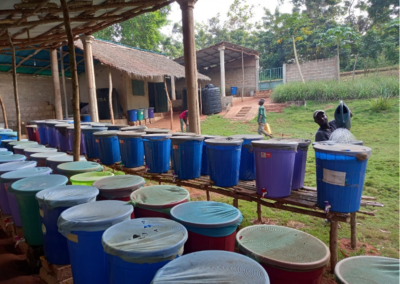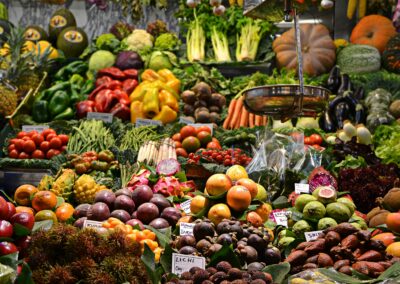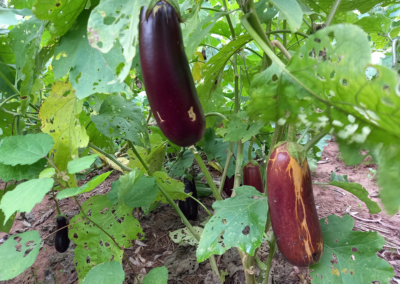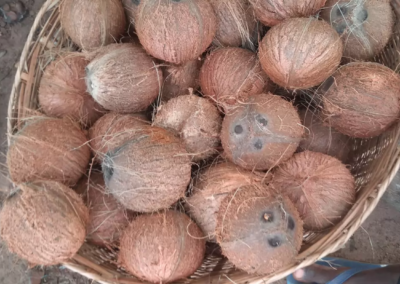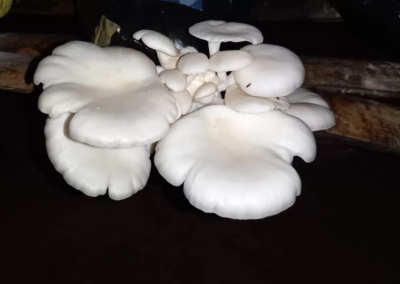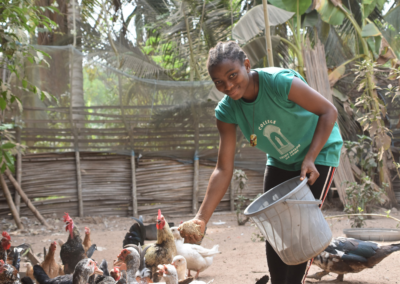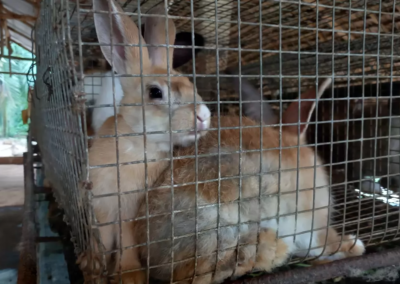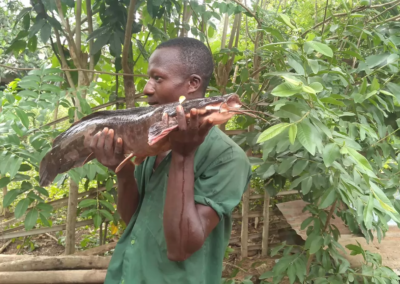Farm 3
SAIN (Solidarites Agricoles Integrees) Farm
Overview
The SAIN farm conducts a variety of operations. It manages a biofertilizer production unit, annually producing 105,000 litres of liquid fertilizers and 100 tons of solid fertilizers, notably vermicompost. It also cultivates tomatoes and rice, yielding an average of 11 tons per hectare and 6 tons per hectare respectively.
In addition, the farm is involved in fish farming, particularly tilapias and clarkias, with an estimated annual production of 5 tons. It farms pineapples and oranges, producing on average 60 tons and 6 tons per year respectively.
Furthermore, the farm produces pineapple and orange juices, with an average annual output of 25 thousand 33Cl bottles. It also produces coconut oil at a rate of 500 litres per year, and 10,000 coconut plants for planters.
Lastly, the farm participates in oil palm cultivation, leading to an estimated annual red palm oil production of 12,000 litres. It also grows green peppers, yielding an average of 350 kg per hectare.
Integrated Farm Production System SAIN
By committing to the practice of sustainable agriculture with zero synthetic inputs, the farm was very early confronted with great challenges in terms of access to alternative inputs (fertilizers, pesticides) to maintain acceptable levels of productivity. To achieve this, an integrated system (see diagram below) was put in place to enhance the functionalities of nature, promote soil life and natural biodiversity.
Within this system, a careful recycling of all by-products and residues is carried out for internal valorisation, eliminating the need for external materials. The by-products of livestock farming are used directly or indirectly for fertilization, while at the processing workshop, the residues are used to feed a biodigester, resulting in the production of methane and an effluent (digestate) that serves as fertilizer.
The operation works on the principle of « from the farm to the fork » where the vast majority of the farm’s products undergo a first transformation before being put on the market.
Production of bio-inputs and action-research activities
One of the great challenges of practicing agroecology on the farm is access to good quality organic inputs. In the history of SAIN Farm and still today, several innovative initiatives to develop bio-inputs (fertilizers, pesticides) have been undertaken to cover at least internal needs. Several formulations have been made; products have been tested on several crops to test their effectiveness. The best formulations are adopted and scaled up for mass production.
The action-research device set up therefore allows to experiment with products developed through demonstration plots, Peasant School Fields (PSF) in collaboration with the agricultural world, advisers, research institutes and the university. The PSFs today constitute a very appreciated channel for the diffusion and dissemination of good agroecological practices and organic inputs.
Training Program
In addition to the CEPs, SAIN Farm has developed a training program that not only supports the transformation of agricultural and food systems but also relays the results of the action-research device. Two types of training are offered today; tailor-made training courses oriented according to the needs of the applicant and comprehensive continuing education courses addressed to young people seeking socio-professional integration through agricultural professions. These trainings are oriented towards specific agricultural professions of the young people’s free choice for better professionalization. They not only acquire knowledge and skills related to the agricultural sector but also improve their self-confidence, develop life skills and gradually a leadership allowing them to better find their direction and insertion.
The vocations are among others:
- to train and support the installation of young people who have dropped out of school and are in difficult situations who wish to integrate into agricultural and para-agricultural professions,
- to ensure the continuing professional training of farmers and other agricultural professionals wishing to improve and improve their productivity in sustainable agricultural systems.
- to conduct action-research activities to experiment and develop sustainable agroecological innovations that are shared with the network of young people who have left the training Center.
- Beyond the functions of agricultural production and action research in rural areas, the farm has set up Agritourism Services with some guest houses and developed tourist circuits allowing the public to discover/visit the farm, its agroecological practices but also the territory of insertion of the farm through these activities, customs, and traditions. This is an excellent channel to discover the agricultural practices of the Center, its environmental sensibilities, and the climate. This finally makes local consumption a reality by allowing visitors to consume on-site the products of the farm.



